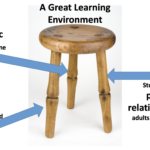“What about kids who just don’t care?”
When I’m supporting teachers in schools, either around classroom management and discipline or academic engagement and motivation, this is a question that often comes up.
We all know these kids, don’t we? They
Classroom management and academic engagement are two of the most important aspects of getting off to a great start in the new school year. Though gem/marble jars, tickets, clip charts, and other incentive systems (including traditional grades) are common throughout
A Conversation Between Starr Sackstein and Mike Anderson
Starr Sackstein and I each often hear a worry from teachers we work with. They’re dedicated to the profession but are feeling exhausted, worn out, and stagnant. They aren’t sure what to
Are you a teacher struggling to keep your students engaged? You’re not alone. A team of teachers at Sandown North Elementary School faced similar challenges, witnessing a decline in student engagement and an uptick in students that were dysregulated. Instead
A great learning environment is like a three-legged stool. Ruth Charney first introduced this concept to me years ago. It’s an important idea to keep in mind all year long, but it’s crucial during the first weeks of school.
The
I know many educators bemoan retakes. It is often seen as giving kids too many chances, not holding them accountable, and generally “lowering the bar.” I’ve heard the warning “There are no retakes in real life!” too many times to
What Are We Doing Today in Physical Education?
“What are we doing today?” is the most frequently asked question by my middle school students while entering the gym to get ready for class. After my response, students will usually either
Square pegs and round holes. This phrase plays over and over in my head each time I try to assign a letter grade to my students at the end of a marking period. My students’ learning is so complex, and
Walk through most schools, and you’ll see messages like the ones above, posted in classrooms and in hallways. We often encourage kids, as they’re about to work to “try your best” or “put in max effort.” One year in
A few years ago my wife gave me three months of coaching for my birthday. I’d been running 5K road races and was trying some half-marathons. She thought I could use some professional help! We connected online, and I sent
“How’d it go?” On the surface, it is such a basic question. I’ve been asked that question plenty of times in my life. After a sports game, doctor’s appointment, or school meeting, not to mention that nerve-wracking best man’s speech
What did the mathematical acorn say when he grew up?
“Ge-om-e-try!” (“Gee, I’m a tree!”)
Ah—dad jokes. Silly plays on words. Puns. Cornball humor. Eye-rollers. Groaners.
Ted Lasso is packed with goofy humor. Have you noticed how this keeps your
My wife and I loved watching Ted Lasso. In fact, when our daughter came home from college for the holidays, we got her into it and watched both seasons again! One of the most powerful and uplifting scenes comes in
A Brief History of Behaviorism, Part 5
If you could travel back in time about 60 years and walk through a typical school, you might be surprised to find something missing. You wouldn’t see behavior charts or “star student” award
A Brief History of Behaviorism, Part 4
If you could travel back in time about 60 years and walk through a typical school, you might be surprised to find something missing. You wouldn’t see behavior charts or “star student” award
A Brief History of Behaviorism, Part 3
If you could travel back in time about 60 years and walk through a typical school, you might be surprised to find something missing. You wouldn’t see behavior charts or “star student” award
A Brief History of Behaviorism, Part 2
If you could travel back in time about 60 years and walk through a typical school, you might be surprised to find something missing. You wouldn’t see behavior charts or “star student” award
A Brief History of Behaviorism, Part 1
If you could travel back in time about 60 years and walk through a typical school, you might be surprised to find something missing. You wouldn’t see behavior charts or “star student” award
In this vlog post, published through Eduplanet21, I share a story about a student who seemed motivated but wasn’t really self-motivated. She was always seeking my approval: “Is this okay? Is it good enough?” I tell about how I helped
Don’t look now, but the end of the school year isn’t far away. Of course, we know how important the first weeks of school are, but what about the last weeks of school? Surely, this is just as important a
As schools welcome more and more students back through their doors, we’re all trying to figure out the best way to do so. It seems as though there are two wildly different needs we must address. As I talk with
As educators, we all want our students to be motivated. Teachers and schools often pour immense amounts of energy into trying to motivate students, yet often it seems like the more we try, the less kids care. What’s going on?
You want at-home learning to feel purposeful and engaging for students, but you don’t want to further overwhelm yourself with work. What if there was a way to both boost student engagement and reduce the daily assigning, correcting, and keeping
Games can boost engagement and learning for students while also reducing teacher workload--a win-win!
What if there was a learning strategy that boosted student engagement, had many (many!) academic benefits for students, and reduced teacher planning and correcting/grading time? Great news! There is–and it’s a tried and true strategy you have probably been using











